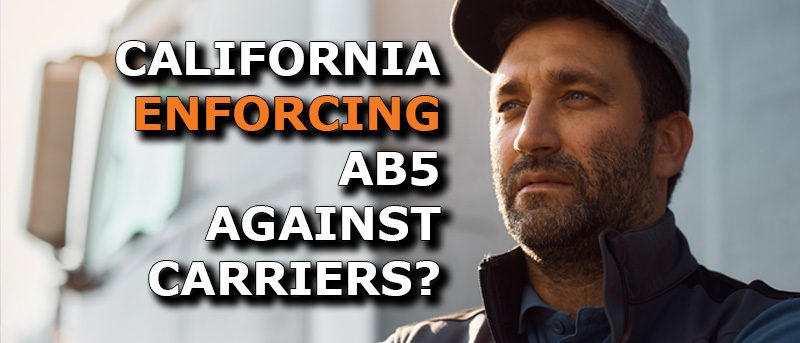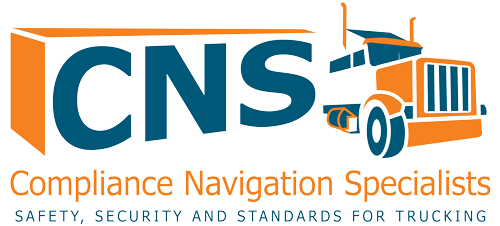Is California Enforcing AB5 Against Trucking Companies?

What Fleets Need to Know After the First Major Enforcement Case
Summary:
- California will enforce AB5
- California will target carriers, subcontractors, and even retail giants
- California will use both the ABC test and Borello to establish liability
- California will pursue penalties and back wages
For years, California’s independent contractor law — AB5 — has loomed over the trucking industry with uncertainty.
Passed in 2019 and fully applicable to trucking since mid-2022, AB5 introduced the strict “ABC test,” making it extremely difficult for motor carriers to classify drivers as independent contractors.
But despite all the concern, there had been no major enforcement actions specifically targeting trucking… until now.
In late 2024, the California Labor Commissioner’s Office issued roughly $868,000 in penalties against three companies — Mega Nice Trucking, Ryder Last Mile, and Costco — for misclassifying drivers and violating multiple California labor laws. This appears to be the first publicly identifiable AB5-related enforcement action impacting the trucking sector.
So, the big question fleets are now asking: Is California actually enforcing AB5 against trucking companies?
Yes — and this first case signals that more enforcement is likely to come.
What Happened in the First AB5 Trucking Enforcement Case?
According to the California Labor Commissioner:
- 58 drivers were found to be misclassified.
- Ryder Last Mile and Costco, who subcontracted Mega Nice Trucking, were deemed joint employers.
- The companies were cited for:
- Minimum wage violations
- Overtime violations
- Missed meal and rest breaks
- Failure to provide paid sick leave
- Total penalties assessed: $868,127.76
- Approximately $663,000 will go directly to drivers.
Although AB5 wasn’t named explicitly in the state’s public release, the agency confirmed to FreightWaves that: AB5 and the ABC test were used in determining the violations, along with the older Borello standard.
This makes the case the clearest example yet that AB5 enforcement is active and trucking companies are firmly in the crosshairs.
Why This Case Matters to Trucking Companies
1. “Joint Employer” Liability is Now Real
This case shows that the following entities can all be held equally liable if an independent contractor is misclassified:
- Carriers
- Brokers
- Warehouses
- Retailers
- Last-mile companies
2. Enforcement Will Not Be Limited to Carriers
In the Mega Nice case, two massive companies — Costco and Ryder — were penalized simply because they exercised control over delivery operations.
If you direct or control the work, you may be considered the employer.
3. The ABC Test Remains Extremely Difficult for Trucking
Under AB5, a driver can only be an independent contractor if the company can prove:
A. The driver is free from control
B. The driver performs work outside the usual course of the company’s business
C. The driver operates an independently established business
Prong B alone eliminates most traditional trucking-owner-operator models.
4. Shippers and 3PLs Are Now at Risk Too
Shippers who regularly use contractors at California warehouses or last-mile operations must now evaluate whether their logistics partners are AB5-compliant.
Who Should Be Concerned?
Any trucking-related business operating in California, including:
- Motor carriers using owner-operators
- Logistics companies and 3PLs
- Delivery service providers
- Warehouses and DCs
- Retailers contracting for last-mile delivery
- Out-of-state fleets operating in or near California
If your operation touches the state, AB5 applies.
How Trucking Companies Can Protect Themselves from AB5 Risks
Whether you operate in California or partner with carriers that do, the following steps are essential:
1. Eliminate Contractor Models That Don’t Pass the ABC Test
If drivers do the following, then they are likely employees in California:
- Run loads for you,
- Wear your colors,
- Use your technology,
- Operate on your schedule,
Avoid models where:
- You dictate dispatch or delivery times
- Drivers rely solely on you for work
- Drivers operate under your authority
2. Strengthen Business-to-Business (B2B) Compliance
California allows ICs under the B2B exemption, but it requires strict documentation, such as:
- Contractor must be independently incorporated or LLC
- Contractor must market services to multiple clients
- Written contract required
- Contractor controls the work and equipment
- Contractor provides its own business location
Even then, it’s still risky — but some fleets successfully use this model with strong legal oversight.
3. Audit Your Driver Qualification and Hiring Processes
If you convert ICs to employees or hire new drivers, ensure full compliance with:
- FMCSA DQ file regulations
- Clearinghouse full queries
- PSP, MVR, and prior employer checks
- Pre-employment drug & alcohol testing
- Medical card verification
- Required onboarding documentation
4. Review Contracts with Carriers, Brokers, and Shippers
Contracts should clearly outline:
- Control and responsibility
- Liability allocation
- Compliance expectations
- Worker classification responsibilities
5. Train Dispatchers, Managers, and Supervisors
Misclassification often happens because frontline staff unintentionally “direct and control” drivers.
Educate personnel on:
- Avoiding employer-like control over contractors
- Proper communication practices
- Documentation requirements
6. Work with a Compliance Partner
Given the legal complexity of AB5, many fleets are restructuring their operations. CNS can help with:
- Driver hiring
- DQ file management
- Onboarding IC-to-employee transitions
- Clearinghouse and drug-testing compliance
- HR and DOT safety processes during fleet restructuring
How CNS Can Help Fleets Hiring Drivers Under AB5
If AB5 pushes your company toward hiring employees instead of contractors, CNS offers a turnkey New Driver Hire Program.
We streamline onboarding and ensure full FMCSA compliance with:
- Complete Tailored DQ File Setup (paper or digital)
- Initial Safety Audit
- Prior Employer Checks
- MVR & PSP Reports
- Clearinghouse Full Query
- Medical Card Verification
- Pre-employment drug test coordination
- Online record retention
- Dedicated new-hire support
We manage your onboarding paperwork, compliance, and recordkeeping — while you focus on keeping freight moving.
This service is often cheaper and more reliable than handling compliance in-house, especially during rapid hiring or restructuring.
For more information, contact us at 888.260.9448, email us at , or fill out the form below.
Questions about DOT Compliance, Licensing, Audits, Programs, etc.?
Our DOT Specialists are here to help!
What are you searching for?
Is DOT Compliance your Top Priority?
Our DOT Compliance Programs ensure it is your top priority and keeps your business running.
Related Services
Subscribe to our Monthly Newsletter
Receive the latest transportation and trucking industry information about FMCSA and DOT Audits, Regulations, etc.
Related news
Trucking News
Get the latest trucking news on DOT Compliance, Licensing, Audits, and more!

DOT SAP Program Explained (2026 Guide)
Requirements, Timeline, Costs, and What Drivers Need to Know Drug and alcohol violations remain one of the fastest ways for CDL drivers to be removed

New Law Codifies English Language Proficiency as an Out-of-Service Violation
On February 4, 2026, President Trump signed into law a federal funding bill that not only ended a partial government shutdown but also delivered several

Paper Medical Cards Still Valid: FMCSA Issues 60-Day NRII Transition Waiver for CDL Drivers
The Federal Motor Carrier Safety Administration (FMCSA) has issued a new waiver related to the National Registry II (NRII) medical certification process, extending temporary flexibility
